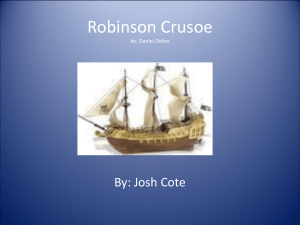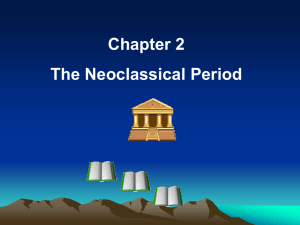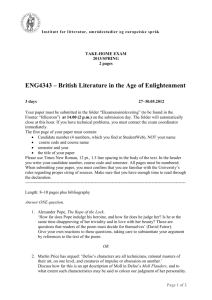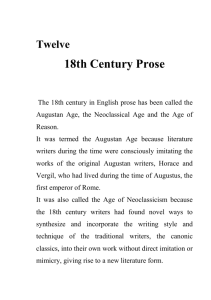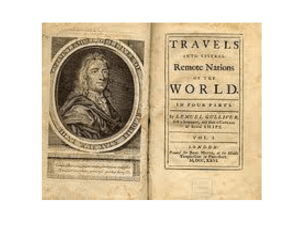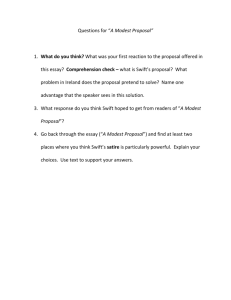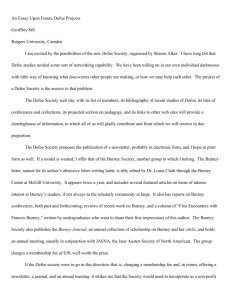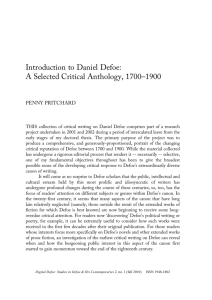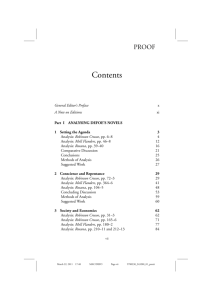Beyond Ideology and Utopia
advertisement
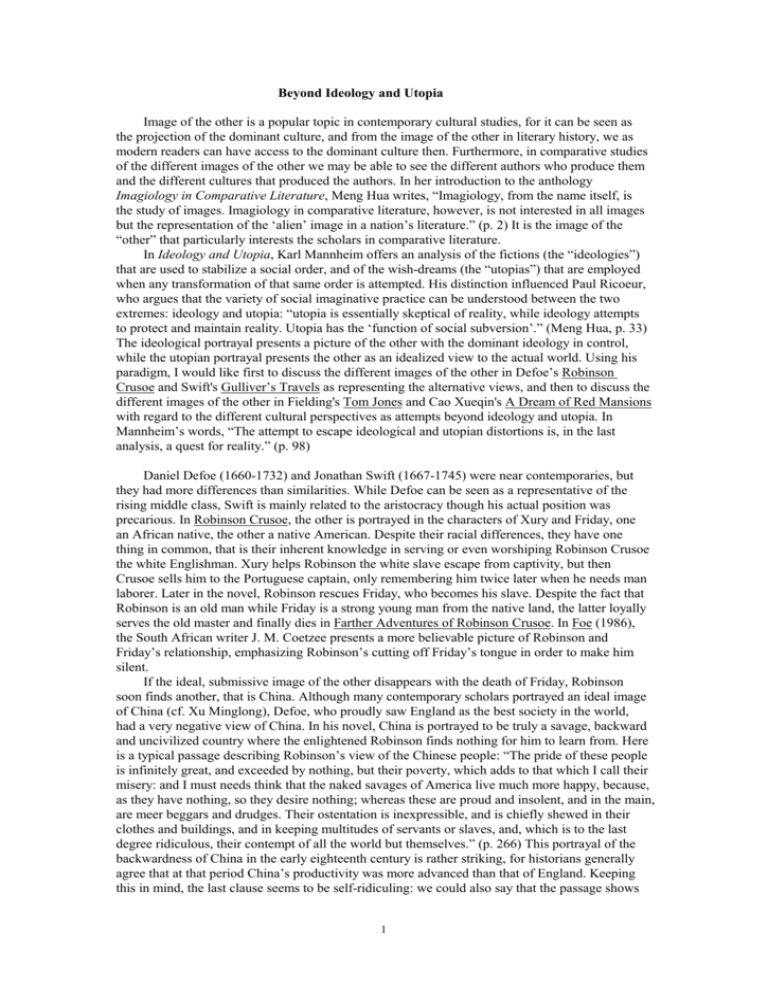
Beyond Ideology and Utopia Image of the other is a popular topic in contemporary cultural studies, for it can be seen as the projection of the dominant culture, and from the image of the other in literary history, we as modern readers can have access to the dominant culture then. Furthermore, in comparative studies of the different images of the other we may be able to see the different authors who produce them and the different cultures that produced the authors. In her introduction to the anthology Imagiology in Comparative Literature, Meng Hua writes, “Imagiology, from the name itself, is the study of images. Imagiology in comparative literature, however, is not interested in all images but the representation of the ‘alien’ image in a nation’s literature.” (p. 2) It is the image of the “other” that particularly interests the scholars in comparative literature. In Ideology and Utopia, Karl Mannheim offers an analysis of the fictions (the “ideologies”) that are used to stabilize a social order, and of the wish-dreams (the “utopias”) that are employed when any transformation of that same order is attempted. His distinction influenced Paul Ricoeur, who argues that the variety of social imaginative practice can be understood between the two extremes: ideology and utopia: “utopia is essentially skeptical of reality, while ideology attempts to protect and maintain reality. Utopia has the ‘function of social subversion’.” (Meng Hua, p. 33) The ideological portrayal presents a picture of the other with the dominant ideology in control, while the utopian portrayal presents the other as an idealized view to the actual world. Using his paradigm, I would like first to discuss the different images of the other in Defoe’s Robinson Crusoe and Swift's Gulliver’s Travels as representing the alternative views, and then to discuss the different images of the other in Fielding's Tom Jones and Cao Xueqin's A Dream of Red Mansions with regard to the different cultural perspectives as attempts beyond ideology and utopia. In Mannheim’s words, “The attempt to escape ideological and utopian distortions is, in the last analysis, a quest for reality.” (p. 98) Daniel Defoe (1660-1732) and Jonathan Swift (1667-1745) were near contemporaries, but they had more differences than similarities. While Defoe can be seen as a representative of the rising middle class, Swift is mainly related to the aristocracy though his actual position was precarious. In Robinson Crusoe, the other is portrayed in the characters of Xury and Friday, one an African native, the other a native American. Despite their racial differences, they have one thing in common, that is their inherent knowledge in serving or even worshiping Robinson Crusoe the white Englishman. Xury helps Robinson the white slave escape from captivity, but then Crusoe sells him to the Portuguese captain, only remembering him twice later when he needs man laborer. Later in the novel, Robinson rescues Friday, who becomes his slave. Despite the fact that Robinson is an old man while Friday is a strong young man from the native land, the latter loyally serves the old master and finally dies in Farther Adventures of Robinson Crusoe. In Foe (1986), the South African writer J. M. Coetzee presents a more believable picture of Robinson and Friday’s relationship, emphasizing Robinson’s cutting off Friday’s tongue in order to make him silent. If the ideal, submissive image of the other disappears with the death of Friday, Robinson soon finds another, that is China. Although many contemporary scholars portrayed an ideal image of China (cf. Xu Minglong), Defoe, who proudly saw England as the best society in the world, had a very negative view of China. In his novel, China is portrayed to be truly a savage, backward and uncivilized country where the enlightened Robinson finds nothing for him to learn from. Here is a typical passage describing Robinson’s view of the Chinese people: “The pride of these people is infinitely great, and exceeded by nothing, but their poverty, which adds to that which I call their misery: and I must needs think that the naked savages of America live much more happy, because, as they have nothing, so they desire nothing; whereas these are proud and insolent, and in the main, are meer beggars and drudges. Their ostentation is inexpressible, and is chiefly shewed in their clothes and buildings, and in keeping multitudes of servants or slaves, and, which is to the last degree ridiculous, their contempt of all the world but themselves.” (p. 266) This portrayal of the backwardness of China in the early eighteenth century is rather striking, for historians generally agree that at that period China’s productivity was more advanced than that of England. Keeping this in mind, the last clause seems to be self-ridiculing: we could also say that the passage shows 1 Defoe or Crusoe’s “contempt of all the world but themselves.” Defoe’s strongest contempt is shown in the following passage: “But when I come to compare the miserable people of these countries with ours, their fabricks, their manners of living, their government, their religion, their wealth, and their glory, (as some call it) I must confess, I do not so much as think it is worth naming, or worth my while to write of, or any that shall come after me to read.” 266 And Defoe or Crusoe writes further: “They have firearms, ‘tis true, but they are awkward, clumsy, and uncertain in going off: they have powder, but it is of no strength; they have neither discipline in the field, exercise to their arms, skill to attack, or temper to retreat; and therefore, I must confess, it seem’d strange to me, when I came home, and heard our people say such fine things of the power, riches, glory, magnificence, and trade of the Chinese; because I saw, and knew that they were a contemptible herd or crowd of ignorant sordid slaves, subjected to a government qualified only to rule such a people… 267 We must admit that Defoe’s notion of the backwardness of Chinese weapons is correct, but the general tone of contempt and the overall charge against China are by no means justified. The late Professor Fan Cunzhong writes about Defoe’s attack against China: “We may know what he says, but we don’t know why he says so.” (p. 45) Indeed, we could only speculate about Defoe’s reasons for attacking China, and the most obvious and probable reason seems to be his pride of his own country’s progress and civilization, a kind of pride he expresses in almost all his writings. To glorify England is his lifelong mission, and attacking the idealized China or Chinese is a “ready and easy way.” His concern with the reader may also be taken into account. While the Jesuit reports about China particularly appealed to the upper-class intellectuals, Defoe who held the common reader in view, can serve his purpose best by demonizing China. The case with Swift is very different. In Gulliver's Travels, Swift presents various images of the other as critique of contemporary England or Europe. This is especially true in Gulliver's voyages to Brobdingnag and the Houyhnhnmland, where the native rulers seem to be idealized primitive men: they don't have complicated legal systems, nor do they have well developed languages, but they could have a simple and well-managed society, which is free of the corruptions and vices common in the human world. Comparing Swift's portrayal of the other with Defoe’s, we could see the clear differences, and despite the common belief that Swift is conservative while Defoe is more liberal in their social views, Swift can be seen as more radical in his severe critique of contemporary England and its colonial expansion. In Donald Stone’s recent study of the two works, he argues that though Swift, due to his emphasis on unknown lands, does not mention China in Gulliver’s Travels, many of the images or ideas he talks about in the utopian Brobdingnag and Houyhnhnmland, have strong similarities to his mentor Sir William Temple’s references to China. He writes, “[I]n the fourth and second of Gulliver’s voyages, Swift suggests—however hyperbolically—that there is a world different from Europe, one that lives according to reason and that reveres and rewards virtue. This Utopian realm, occupied by horses or giants, bears similarities to the China eulogized by the Jesuits and by Swift’s mentor.” (pp. 3-4). Now it is not to the point to argue whether Defoe's or Swift's image of the other is the correct or valid one, for both are primarily the authors' own projections with special ideological agenda in mind. What is more interesting is that both images seem to be rather simple or straightforward projections: Defoe's white man is the dominant figure while his natives are all ready to serve or obey the white man and his Chinese Other is just despicable; Swift's portrayals of the other are more idealized figures in contrast to the less perfect or essentially quite corrupt English or Europeans. Using Mannheim’s distinction and the French imagiologists’ formulations, we could see that in the two cases discussed above, Robinson Crusoe demonstrates Defoe’s ideological prejudice, while Gulliver’s Travels, especially in Parts II and IV, presents images of utopia as critique of modern England or Europe. What is more, neither Defoe nor Swift had any direct experience of the other portrayed in their novels, and this identical feature well proves Jean-Marc Moura’s point: “An author is not seeing the alien country, but creating it according to his own consciousness. That is to say, imagiology studies the creators of imagination.” (Meng Hua, p. 27) Two decades or so later, when we get to Fielding's Tom Jones and Cao Xueqin's A Dream of Red Mansions, we seem to confront more complicated issues. In contrast to Robinson Crusoe and 2 Gulliver's Travels, Tom Jones and A Dream of Red Mansions are essentially domestic novels, novels about one's own country with little reference to foreigners or foreign land. What distinguishes the two later novels is primarily their panoramic portrayal of contemporary society, each presenting in its own way one unforgettable and unique picture of its own society. But despite their focus on contemporary domestic society, each novel also presents an important image of the other and thus can be discussed in relation to the two earlier novels. On his way to London, Tom Jones and his companion Partridge meet a group of Gypsies, known also as Egyptians. The leader or the monarch treats Tom well, but Partridge is caught in a compromising situation with a Gypsy woman. Tom first apologizes for Partridge's misbehavior, but the monarch suspects the situation. After a careful inquiry, the monarch finds out that the woman’s husband deliberately set up the situation in order to trap and blackmail Partridge. The monarch then determines that it is his own people's fault, so he sets Partridge free but punishes the man and his wife by putting them to shame. Richardo L. Ortiz comments on this episode: “Fielding here brings together, I would argue, the extremes of primitivism [the king’s rule?] and civilization [sex as commodity?] to suggest that the prevailing construction of our base vices may indeed be functions of our most complex social arrangements, and not the leftover of some inaccessibly past, but stubbornly lingering, ‘primitive’ state. But this scene also ‘saves’ the Gypsy king from the sterile, closed circle of his heavily mythologized historical discourse, plunging him into the open-ended, improvisational mode of ‘modern’ political, juridical discourse.” (621) Tom is very much impressed by the Gypsy leader's wise judgment. But fearing that the reader might take this instance as showing the absolute monarchy an ideal, the narrator intrudes to say that he does not mean so. “As the examples of all ages show us that mankind in general desire power only to do harm, and when they obtain it use it for no other purpose, it is not consonant with even the least degree of prudence to hazard an alteration where our hopes are poorly kept in countenance by only two or three exceptions out of a thousand instances to alarm our fears. It this case, it will be much wiser to submit to a few inconveniencies arising from the dispassionate deafness of laws than to remedy them by applying to the passionate open ears of a tyrant.” (XII. xii. 572) This is an appropriate message because in 1745 England was facing a serious Jacobite Rebellion with the purpose of restoring the Stuart monarchy. Fielding, a strong supporter of the Hanoverian house established by the Parliament as a constitutional monarchy, had the political crisis in mind and did not want any absolute monarchy. Thus, the Other we see here is just a short anachronistic view of the ideal honest monarch, which may be presented as a partial example for the modern monarch to learn something from, but not an ideal model for modern England. In A Dream of Red Mansions (David Hawkes uses the title The Story of the Stone) we see a similar intrusion of the other or double intrusions. In Chapter 49, Xue Baoqin, on her way to be married to her predestined fiancée, comes to the Jia house for a short visit, and she is presented to be a kind of ideal beauty. Here is Baoyu’s excited report about Baoqin to his maidservants: “And as for the sister—you’re always saying what a beauty Cousin Chai is, but wait till you’ve seen her!” (II, 469) Aroma thinks Baoyu must be exaggerating crazily and does not go to see the girls. But when Tan-chun comes she asks for her opinion. Tan-chun, who is known for her cool judgment, replies similarly: “I think even Bao-chai is not quite as beautiful as her.” (470) Furthermore, Baoqin appears to be a new combination of the merits of Dai-yu and Bao-chai, for though she is Bao-chai's closer relative, she stays in Daiyu's apartment. This ideal combination seems to echo the short mentioning of Qin Keqin as having both the beauties of Daiyu and Baochai. Since there is no foretelling of Baoqin’s appearance in the novel, she can be seen as a foreign intruder. But on the other hand, as the Chinese novel is pre-occupied with the large and complex Chinese family relationships, Baoqin’s appearance can be perfectly justified in the same way as that of Lady Xing’s niece and the young widow Li Wan’s cousins, even though the other girls only play minor roles. But what is more interesting is that Baoqin herself introduces a real foreigner into the discourse, if not the story, of the novel: a west-ocean girl who could write Chinese poetry. Baoqin met this girl when she was accompanying her father in her eighth year on a business trip abroad. After describing the foreign girl’s remarkable beauty, she concludes: “They said that she had a perfect understanding of our literature and could expound the Five Classics and write poems in 3 Chinese. My father asked her through an interpreter if she would write something for us in Chinese characters and she wrote out one of her own poems for him.” (Ch. 52; II. 540) Later on, Baoqin recites the poem to gratify her cousins’ curiosity. Just like the Gypsy episode in Tom Jones, the foreign girl’s appearance in the discourse of the novel is very surprising. Given the author’s meticulous care of composition, one cannot help asking what the author’s purpose is. If Baoqin as the ideal image is quite acceptable to the social convention (the Old Dowager asks about her age and thinks of a possible match with Baoyu), the west-ocean girl is rather incompatible to the social convention: she shows her poetry to others (foreigners to her) and wears a sword: not like a proper female at all. This short intrusion, or intrusion within the intrusion, might be seen as demonstrating Cao Xueqin’s more advanced view about the outside world despite the apparent inconsistencies. Compared with the portrayal of the Other as either ideology or utopia seen in Defoe and Swift, the rather limited portrayal in Tom Jones or A Dream of Red Mansions seems to be more complicated. The two later authors are not primarily concerned with presenting a consistent view of the other, but with using the other as complements in the main design of the novel. As a result, they seem to be going beyond mere ideology and utopia. In the development of the novel, to go beyond ideology and utopia is the necessary step towards literary realism. And it is in this direction that the great masterpiece novels are created even though the distinction of ideology and utopia is a significant and productive tool of imagiological analysis. References in English: Tsao Hsueh-chin and Kao Ngo. The Dream of Red Mansions (in three volumes). Trans. Yang Hsien-yi and Gladys Yang. Beijing: Foreign Language Press, 1978. Cao Xueqin and Gao E. The Story of the Stone (in five volumes). Trans. David Hawkes (Ch. 1-80) and John Minford (Ch. 81-120). (London: Penguin Books, 1973-1986. Defoe, Daniel. The Farther Adventures of Robinson Crusoe, Being the second and last part of his life, written by himself. London: Constable & Company Ltd., (MCMXXV)1925. Fielding, Henry. Tom Jones. New York: Penguin, 1963. Mannheim, Karl. Ideology and Utopia. Trans. Louis Writh and Edward Shils. New York: Harcourt Brace Jovanovich, Publishers, 1936. Ortiz, Richardo L. “Fielding’s ‘Orientalist’ Moment: Historical Fiction and Historical Knowledge in TJ,” Studies in English Literature 33 (1993) 609-28. Stone, Donald. “Swift, Defoe, and the Jesuits,” 2002, unpublished paper. Swift, Jonathan. Gulliver’s Travels. New York: Norton, 1985. References in Chinese: Fan, Cunzhong. Chinese Culture in England in the Enlightenment Era. Shanghai: Foreign Language Education Press, 1991. Meng, Hua, ed. Imagiology in Comparative Literature. Beijing: Peking University Press, 2001. Xu, Minglong. The Chinese Vogue in Europe During the Eighteenth Century. Taiyuan: Shanxi Education P:ress, 1999. 4
